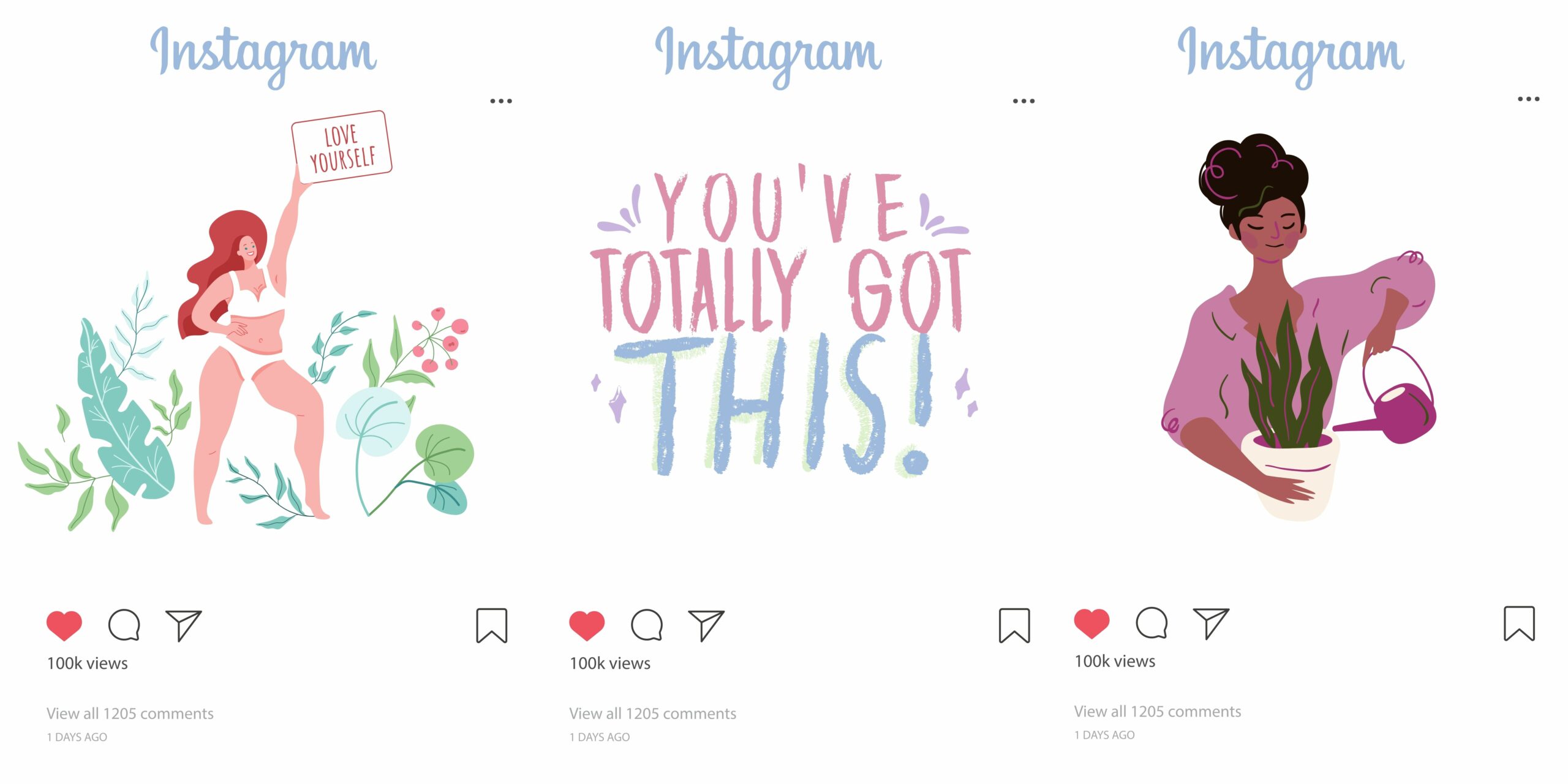What you surround yourself with online can contribute immensely to your mental health. Controlling what you give your attention to is key in maintaining a balanced mental state. Graphic by Isabella Ernsberger.
ISABELLA ERNSBERGER | OPINION COLUMNIST | iernsberger@butler.edu
Over the past few years, I have noticed my perception of myself and the world around me has changed for the better. During my freshman year of high school, I remember constantly comparing myself to others and identifying more with sadness than happiness; my music library was full of slow songs, my self-esteem was low and my social media was flooded with posts and ideals that made me feel terrible about myself.
Since then, I have created a social media feed and presence that preaches self-love and provides education on healthy habits. I didn’t realize how much of a positive influence social media could have on my view of myself and others until I noticed that all the quotes from self-love pages I was reading on a daily basis had become my own thoughts about myself, or how social media taught me about setting boundaries and implementing them in my own life.
Dr. Stephen Barnard, an associate professor and chair of the department of sociology and criminology at Butler, said our perception of ourselves is shaped by what we give our attention to.
“If you’re surrounding yourself with all happy news, or all happy information … you’re gonna see popular positive things,” Barnard said. “Many would say ignorance is bliss. The antithesis of that is also true. If you’re engaging just in bad news, then … that can lead to what’s sometimes described as mean world syndrome, where you just think of the world as a terrible place because all you do is read crime news all the time. And so, how do you balance those things and how do you balance what’s most important with what you need for yourself?”
Everything is about balance. Knowing what you need for yourself but also ensuring that you’re not being “blissfully ignorant” is key to achieving balance with your social media use.
Personally, I try to use my social media to not only improve my mental well-being, but also share the things I find helpful or issues I feel passionately about. I try to prioritize being vulnerable with my audience and aim to make sure I’m not just showing the highlights. I share posts that I deem meaningful in hopes that it will find someone who needs it.
Graphics courtesy of @itsbananacrush, @christineowensart and @wetheurban on Instagram.
Gia Flynn, a first-year psychology major, said she tries to post the content her younger self needed but didn’t have.
“I’m trying to promote more of what I wish I saw,” Flynn said. “Something that I posted earlier this week was this post saying let’s normalize setting up boundaries and [saying] ‘I can’t, I won’t. I don’t have the time. I don’t have the mental capacity. I don’t have the emotional bandwidth.’ You don’t hear those phrases enough. That’s a good reminder for people … to be gentle with yourself.”
Before posting anything, I always keep in mind that after I hit the share button, people will see it. Remembering that I have an audience guides me in what I choose to post. So, sharing those reminders to them that it’s okay if all they did today was get out of bed or that it’s okay to prioritize yourself, is important to me in my mission to create a social media space that both I and others want to be in.
Abby Schuman, a first-year health sciences major, shared the pressure she feels knowing she has people watching what she posts.
“I think, subconsciously, I create a certain ideal that I have to follow along with, or at least try to keep up with or live up to,” Schuman said. “It definitely creates a pressure sometimes … I would say with social media it’s interesting because you always have an audience.”
Through social media, we are given glimpses into almost anyone and everyone’s life. When everyone else’s realities seem nearly perfect at all times, it becomes easy to forget that people are carefully curating which bits and pieces to share. Social media makes it easier to compare your life to everyone else’s, which becomes especially hard when you’re only seeing their best selves. These are the “ideals” that Schuman is referring to and living up to those is no easy task.
Unrealistic beauty standards, toxic positivity and unhealthy mindsets are common issues I try to overshadow with the posts I share and interact with online. From body-positivity to the importance of vulnerability, trying to start and engage in conversations on these topics is how I choose to use social media for the betterment of myself and hopefully of those around me.
If this sounds like something you want to start doing, some of my favorite accounts on Instagram are @MorganHarperNichols, @TheFemaleWarhol, @poets, @impact and @WeTheUrban. These accounts are a fantastic place to start.
What you surround yourself with online can contribute greatly to how you perceive yourself and others. I encourage you to pay attention to the content that you post and engage with and reflect on the effect it has on you and those you choose to share it with. If it doesn’t serve you mentally, emotionally or physically, why should you, or anyone else, pay attention to it?






